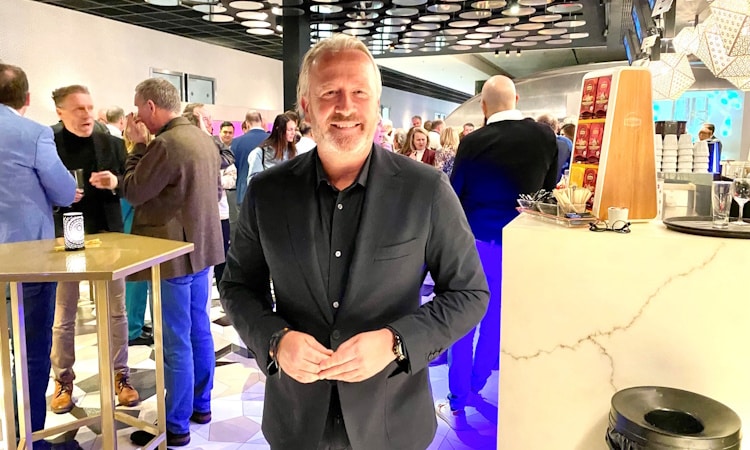
The world will never be the same, but that doesn’t mean people will travel less. With this sentence, Arjan Kers, chairman of the ANVR, gave a concise summary of the current situation that the travel industry is facing. He made his statements on Monday evening during the New Year’s reception of the ANVR at the Jaarbeurs in Utrecht. Kers: ‘If you follow the news every day, it seems as if we are in difficult times. Although Schiphol’s previously planned contraction has been put on hold for the time being, terrible wars, geopolitical tensions, a challenging labour market and rising costs are still causing uncertainty. Nevertheless, the travel behaviour of consumers shows a different picture. Against all odds, wanderlust among the Dutch is actually increasing.’ Kers quoted some news items from last week. ‘Schiphol is approaching the numbers of 2019’ and ‘Eindhoven Airport made history last year by surpassing passenger numbers’. Various studies show that the Dutch are far from tired of holidays. Two-thirds of Dutch people would like to go on holiday more often, and for seven out of ten Dutch people, holidays would be the main spending goal if they had more money. And despite the forest fires and hailstorms of last summer, the Dutchman’s wanderlust continues unabated. ‘2024 looks set to be a banner year for the travel industry, with the slogan ‘All You Need is Holiday’ adorning our leisure sector and where business travel is made more aware, but still remains necessary.’ Kers continued: ‘Although the whole of the Netherlands wants to go on holiday, including our politicians, and the business travel sector is also flourishing again, it is not always made easy for us. The aviation and travel industry are often unfairly criticized and put in a corner and even used populistically to win votes in the last elections. On top of that, the sector is constantly confronted with new regulations, shrinkage plans, restrictions on fossil advertising, ACM regulation, an increase in airport taxes, and all this in a sector that already has to operate with very low margins.’ Kers: ‘Fortunately, our colleagues in our sector are optimists par excellence. They have survived many moments of crisis and are ready day and night to provide the consumer with that unique experience. The next few years will be no different; The world will never be the same, but that doesn’t mean people will travel less. As a sector, we will ensure that people can continue to go on holiday or business travel safely and responsibly.’ In today’s dynamic world, customer service plays an increasingly important role in the success of any business, Kers argued. “As the world accelerates change and new technologies follow each other at a rapid pace, we can only wonder what the future holds for customer service. Customer behaviour is changing, expectations are getting higher and higher and companies have to constantly adapt in order not to be left behind the competition.’ According to Kers, artificial intelligence (AI) and automation will play a crucial role in optimizing customer service processes by 2024. “By automating routine tasks, such as answering frequently asked questions and handling basic requests, customer service agents can focus their attention on more complex and emotionally demanding situations. This will not only improve efficiency, but also save significant costs for companies.” Just like ANVR director Frank Oostdam, Kers also brought up the cabinet in the making. ‘A new cabinet now has the opportunity to actually restore the balance and the relationship with our sector. Connecting to plans that have a real effect on the environment and stimulating entrepreneurship and keeping it intact.’ It will not be down to the efforts of the travel sector, said Kers. ‘That is why we are making an urgent appeal to the government to act as a reliable partner of our sector. Let’s work together on a healthy future for our beautiful sector, which for decades has made millions of Dutch people happy with a beautiful holiday or trip, so that we can continue to allow people to go on holiday or business trips safely and responsibly in the future.’ ‘Helmsmen ashore are shouting that our sector needs to become more sustainable at an accelerated pace, that we should fly less and focus more on the train as an alternative. There is certainly no reluctance there, but that is easier said than done. The train is not a fully-fledged alternative for many holiday destinations, is far too expensive for the time being, connections within Europe are not optimal, and not everyone can afford to take three times as long as by plane.’ Cherry concluded by quoting a column by Nausica Marbee from the Telegraaf, under the headline: ‘Live and enjoy, get rid of flight shame’. ‘It’s too long to read here, but I don’t want to withhold one paragraph from you: Whether the new cabinet will adopt the old desire for containment remains to be seen. But it wouldn’t be out of place if the Netherlands allowed a little more freedom, zest for life and wanderlust. Viviré, Viaggare and Volaré is a wonderful motto.’